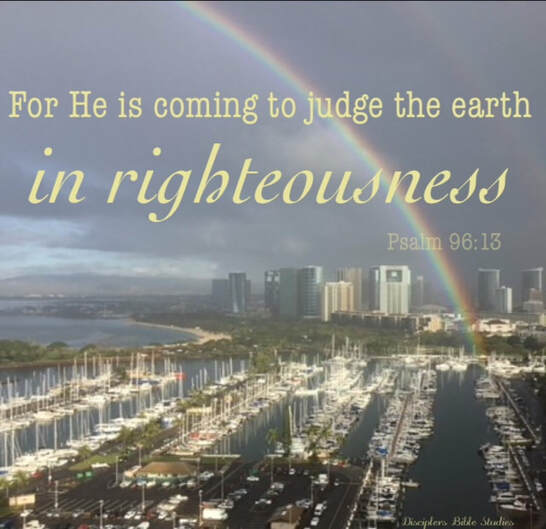 The prophet Zephaniah spoke to the people of Judah at a time when the whole nation had turned away from God and was full of wickedness and corruption. Everywhere, from the elders and officials to the common citizen, the people had forsaken the LORD. Zephaniah compared the judges to rapacious wolves who roamed about in the evening darkness. The prophets were faithless, proclaiming what was in their own hearts and minds. Instead of God's word, they spoke words that tickled the people’s ears. Even the priests perverted the law and failed to lead the people in true worship of God. Men like Zephaniah, who loved God and proclaimed His word, were few and far between. As I read the three short chapters of Zephaniah’s prophecy, it reminded me of our world today. Somehow, it doesn’t surprise me when I hear many people say they can’t bear to watch the news anymore. Neither can I. It seems like the news is filled with stories of corruption, hatred, vitriol, self-centeredness, egotism, opportunism, and just plain evil. We seem to live in a world where God has given us over to our own selfish desires, and the world seems to be spinning in a downward spiral, as it did in the Biblical days of the Judges. I think Zephaniah must have felt the same way in his day. And Zephaniah longed for justice. When you read or watch news on TV, does your heart ever long for justice? Do you long to see justice in government, justice in our judicial system, justice for the powerless, the innocent, the helpless, and for everyday men, women and children who are taken advantage of by those who wield power? If you long to see justice roll down like waters (as the prophet Amos did -- 5:24), you need to read Zephaniah’s prophecy. His is a promise of sure justice to come. Zephaniah foretells the day of God’s judgment, the Day of the LORD. Zephaniah’s heart must have been filled with outrage and pain at the apostasy he saw all around him, because the LORD used Zephaniah’s voice to rebuke the people of Judah and give them warning of the judgment to come. Through Zephaniah, the LORD commanded the people to “Be silent….for the day of the LORD is near” (1:7) and He described a day when His sovereign will would be manifest in a fearsome and final day of judgment which no one will be able escape. “Near is the great day of the LORD, Near and coming very quickly, Listen, the day of the LORD! ……a day of wrath… A day of trouble and distress, A day of destruction and desolation, A day of darkness and gloom, A day of clouds and thick darkness” (Zephaniah 1:14-15). Zephaniah’s prophecy describes the sins of mankind that aroused God’s wrath to bring judgment. He describes the sins of Judah and then the sins of the surrounding nations: sins of idolatry, violence, deceit, double-mindedness, self-indulgence, arrogance, pride, corrupt deeds, and trust in riches rather than God. The day of the LORD will be a day of universal judgment, for all have sinned. It will be a day when all who have turned away from God and refused to listen to Him and His Word will stand before Him and quake in their boots. They will blindly grope for a way of escape, but it will be futile. Deliverance from God’s wrath will be impossible. No one will be able to purchase redemption for, God does not take bribes. No amount of silver and gold will save the wicked on that day, for they will stand condemned by their own sin. At that time, Amos’ desire will be fulfilled. Justice will roll down like waters and righteousness like an ever-flowing stream (5:24). The final verses of Zephaniah’s prophecy tell of the "remnant" -- of those “humble and lowly people” who have sought refuge in the LORD (3:12-13). He will be with them, He will remove all judgment from them, and He will rejoice over them (3:17) And the remnant will shout for joy with all their heart (3:14). But it will not be only the remnant of Israel who will be saved. The New Testament shows us that Zephaniah’s prophecy is universal in scope. On the day God has set (the day of the LORD), He will judge the world in justice and righteousness through the Man whom He has appointed (Acts 17:31), Jesus Christ. All those who have rejected Him will be judged on that day (John 12:48), but as the apostle Paul wrote, ....there is laid up for me the crown of righteousness, which the Lord, the righteous Judge, will give to me on that Day, and not to me only but also to all who have loved His appearing." (2 Timothy 4:8). So if you belong to Jesus Christ and you love and long for His appearing, do not become discouraged by the news of the world and the reprehensible things you see going on around you. Remember: the day of the Lord is coming when justice will be served and all will be set right and made new. The end of His story (history) has already been written. The apostle Paul wrote in 2 Corinthians 2:14, Thanks be to God, who always leads us in triumph in Christ, and manifests through us the sweet aroma of the knowledge of Him in every place. So find hope and comfort in the knowledge that we will triumph in Christ in the end. And in the meantime, we triumph where placed where God has placed us by being the sweet aroma of Christ in a bitter and needy world. With love, ~Suzie
1 Comment
 Martin Luther was a monk, priest, professor of theology, composer, and one of the most important figures in the Protestant Reformation. As a young monk, Martin Luther worked hard, denied himself, and even inflicted physical punishment on himself, seeking to live a righteous life and be justified in God’s sight. With his whole heart he sought to please God, but in his mind he knew he could never measure up. No matter what he did, he could never be pure and holy in the sight of God because he knew he was a sinner. As he searched the Scriptures looking for a solution to his dilemma, God graciously led him to the Book of Romans where he read: The righteous man will live by faith (1:17). By the grace of God’s Holy Spirit, Martin Luther’s eyes were opened to see that all his sacrifices of hard work, self-denial, and self-punishment were in vain. It was only by God’s grace that he could find ease for his conscience, be justified, and stand as righteous before God. His works were nothing but “filthy rags” (Isaiah 64:4). It was his heart of faith, in itself a gift from God, (Ephesians 2:8) that gave him right standing before his Creator and Sustainer. That one short sentence, The righteous man will live by faith, changed Martin Luther’s life and ended up changing the world. But the apostle Paul, in the Book of Romans, was not the first to make that profound and life-changing statement. Hundreds of years before Paul wrote, the prophet Habakkuk had a conversation with God concerning justice and the judgment of the wicked. Before Habakkuk's time, the northern kingdom of Israel had been invaded and carried into exile by the Assyrians because of their rebellion against God and their evil ways. Habakkuk was disturbed because he saw that same rebellion and wickedness in the people of the southern kingdom of Judah in his day. Habakkuk wanted justice to reign, so he took his complaint to God and waited for God’s reply. Chapter 2 of the Book of Habakkuk is God’s answer to the prophet, and in His answer, God proclaimed, Behold, as for the proud one, His soul is not right within him; But the righteous will live by his faith (Habakkuk 2:4). The problem with the people of Judah was their pride. They thought they could live as they pleased. After all, didn’t all the other nations live prideful lives of wanton pleasure, greed, and violence? The people of Judah thought they could scorn God by ignoring His Law and mistreating one another but then turn to Him and find approval by offering their sacrifices. They considered themselves God’s people, but their hearts were not right with Him. In this one simple statement by God, we see that the heart is the most important thing. God does not look upon our sacrifices but upon our hearts. God’s people must be people of faith and it has always been that way. It is by faith we believe in God and His Word and obey Him. The proud person lacks understanding of God’s grace and power and is unable to live a life pleasing to Him. So God says, “His soul is not right within him.” The person who stands as righteous before God humbly admits there is nothing he or she can do to earn the grace of God. The righteous person takes God at His word, humbly taking God’s promise to heart, “By grace you have been saved through faith; and that not of yourselves, it is the gift of God; not as a result of works, so that no one may boast” (Ephesians 2:8). Salvation is God’s grace, freely offered, and accepted humbly by faith. Habakkuk, the prophet, is a beautiful example of one who lived by faith. The final chapter of his prophecy is a prayer, written as a song, in which he asked to see God’s justice and mercy. His song closes with a confession of his faith and expression of his trust in God. May we all take Habakkuk as our example and live by faith. Though the fig tree should not blossom And there be no fruit on the vines, Though the yield of the olive should fail And the fields produce no food, Though the flock should be cut off from the fold And there be no cattle in the stalls, Yet I will exult in the Lord, I will rejoice in the God of my salvation. The Lord God is my strength, And He has made my feet like hinds’ feet, And makes me walk on my high places (Habakkuk 3:17-19). |
SUZIE KLEIN
I have been involved in Disciplers since 1987, as a discussion leader, teacher, writer, and now as director. I am profoundly committed to the stewardship of this ministry which God has entrusted to me for a time. God’s word is the chief joy of my life. I cherish my personal time in the word, and I am filled with gratitude to be able to share His word with you, my fellow disciples in Christ. Categories |

 RSS Feed
RSS Feed